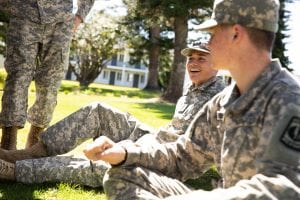 There’s been so much focus on what’s being taught in our schools’ classrooms that parents and even their adolescent and teenage children often are unaware of what learning opportunities lie beyond the traditional school day. So much can be added after school hours to sharpen a student’s academic achievement while providing additional learning opportunities to transform young people into successful adults.
There’s been so much focus on what’s being taught in our schools’ classrooms that parents and even their adolescent and teenage children often are unaware of what learning opportunities lie beyond the traditional school day. So much can be added after school hours to sharpen a student’s academic achievement while providing additional learning opportunities to transform young people into successful adults.
According to a National Center for Educational Statistics (NCES) report a few years ago, the average American student spends a little more than six and a half hours a day in class, leaving the remaining daylight hours for supervised or unsupervised activities, ranging from playing sports, doing homework, working at a part-time job, participating in extra-curricular activities or “hanging out” at home or the mall, not doing much of anything.
While there are several program assets to optimize the quality of education our young people are receiving, there is one often-overlooked resource that a growing number of parents are now considering Boarding schools.
The term, “boarding school,” conjures up for many people visual images of preppy young people in ties, blazers, gray skirts or military uniforms. Others associate such schools with how they’re depicted in movies such as Scent of a Woman, Dead Poets Society, The Emperor’s Club, and of course, Harry Potter’s home away from home, the Hogwarts School of Witchcraft and Wizardry.
Truth be told, boarding schools where students live on campus during the school year are more accurately described as schools where learning never stops. Lessons taught in these schools extend well beyond the walls of the classroom and the clock on the wall to include opportunities for students to learn self-confidence, independence, character, tolerance, compatibility, social etiquette, and teamwork. Boarding schools, especially those for middle- and high-school age students, have the additional time with students to include life skill training alongside a rigorous academic curriculum.
Life skills needed to thrive outside the classroom
The Kiski School, an all-boys boarding school in western Pennsylvania, lists several essential life skills boys will learn in order to thrive in a broader community environment outside the classroom. They are …
- Independence and responsibility. Teenagers are at the perfect stage in life to learn independence and responsibility. At boarding schools, they learn to be responsible for themselves and their possessions while developing self-confidence and self-reliance to manage their time for schoolwork and other activities and stay healthy. Learning these attributes helps them thrive in the “real world” of higher education and work after graduation.
- Broadened personal views. Boarding schools host students from all over the world who share meals, sleeping quarters, classes, personal stories, and cultural insights. What results are close bonds formed among students that transcend geographical, racial, or ethnic differences. They learn that other people’s character is every bit as meaningful as their backgrounds.
- Confidence in social settings. The supportive social and learning environments of boarding schools foster social interactions before, during and after the traditional school day. This enables students to grow together and help instill in each other mutual respect and lifelong self-confidence.
Survey confirms that boarding schools make a big difference
The Big Picture on Boarding Schools survey of boarding school, private day and public-school students and alumni by The Association of Boarding Schools (TABS) showed several examples of the impacts and perceptions among the three categories of students, including the following quantitative findings:
- Academically superior. Some 9 out of 10 boarding school students report that their school was academically challenging, compared to 7 out of 10 from private day schools and 5 out of 10 from public schools. Boarding school students typically spend twice the number of hours each week on homework than their public-school peers. Nine out of 10 boarding school students said they have high-quality teachers while slightly more than 6 out of 10 private day students and half of public school students surveyed said so.
- College preparation and outcomes. Some 87 percent of boarding school students said they were well prepared for college academy while 50 percent and 39 percent of private day and public school students were able to say that. Half of the boarding school graduates surveyed went on to earn advanced degrees, compared with 36 percent for private day schools and 21 percent for public school graduates.
- Life and leadership. Some 77 percent of boarding school students said their schools provided opportunities for leadership, compared with 60 percent of private day school students and 52 percent of public school students. By mid-career, 44 percent of boarding school students were holding top-level management jobs, compared with 33 percent of private day school graduates and 27 percent of public school alumni. By late career, the number for boarding school alumni increased to 52 percent – meaning that one out of two were in top management positions, well ahead of the 39 percent of private day school graduates and 27 percent of public school graduates who had advanced to senior positions.
How to prepare students for boarding school
There are abundant resources to help parents prepare their student for boarding school. Two articles by www.boardingschool.us and www.studyinternational.com list several things parents should cover with their student before going off to a boarding school. We’ll use the all-boys Army and Navy Academy as an example school. A few suggestions from the articles are paraphrased as follows:
- Know what to expect. Life at a boarding school is an exciting – but different — experience. Your son needs to know the positive opportunity he will have, living in a shared accommodation with fellow students, many of whom will be from different countries and cultures. Students who live together learn about each other’s cultures and customs and often form lifelong friendships.
- Establish a routine. It will help if your son learns and adopts certain tasks and functions before leaving for school. For example, waking up earlier than normal, making his bed, keeping his room neat, eating meals at fixed times, and planning tasks and activities ahead for the next day or beyond are just a few. Having a consistent physical fitness routine will help as well. Add to that, having fun.
- Make friends and build a community. Encourage your son to seek out extracurricular activities that help him bond with like-minded peers. Suggest he explore what hobbies or past-time activities he can share with others. A Cadet summed up how he adjusted by making friends at the Army and Navy Academy: “Reach out to fellow Cadets who need a friend, sign up for a sport each season, and join clubs. Friends are valuable … the friends you make … last not only inside of school, but outside school and even for the rest of your life.”
- Connect, but don’t overdo communication. Although keeping an open line of communication with your son while away at school is advised, but in moderation. For example, making nightly phone calls should be avoided; your son needs space. Also, that time of the day is usually devoted to homework or interacting and building relationships with fellow Cadets and becoming a part of the school community.
For further information, visit the Academy website at www.armyandnavyacademy.org; e-mail at admission@armyandnavyacademy.org or phone at 888.762.2338.


